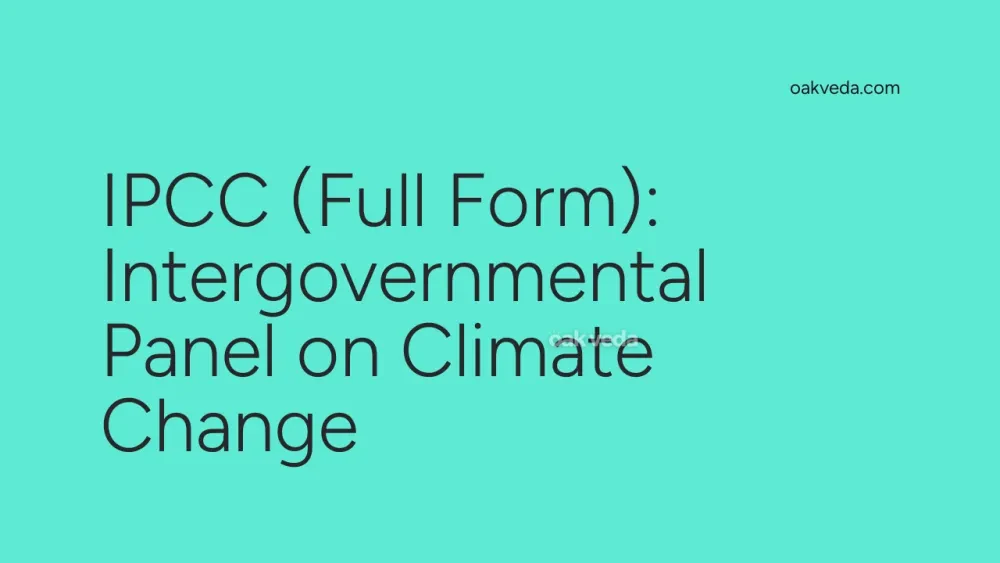
What is the Full Form of IPCC?
The full form of IPCC is Intergovernmental Panel on Climate Change. This international body plays a crucial role in assessing and reporting on climate change-related issues worldwide.
What is Intergovernmental Panel on Climate Change?
The Intergovernmental Panel on Climate Change (IPCC) is a United Nations body responsible for evaluating and synthesizing scientific, technical, and socio-economic information related to climate change. It provides policymakers with regular assessments of the scientific basis of climate change, its impacts and future risks, and potential adaptation and mitigation options.
Origin and Development of IPCC
The IPCC was established in 1988 by two United Nations organizations: the World Meteorological Organization (WMO) and the United Nations Environment Programme (UNEP). Its creation was a response to growing concerns about global climate change and the need for a comprehensive, scientific approach to understanding and addressing this issue.
How does IPCC work?
The IPCC operates through a unique process that involves thousands of experts from around the world:
- Assessment Reports: The IPCC produces comprehensive reports every 5-7 years, synthesizing the latest climate science.
-
Working Groups: Three working groups focus on different aspects of climate change:
- Working Group I: The physical science basis
- Working Group II: Impacts, adaptation, and vulnerability
- Working Group III: Mitigation of climate change
- Volunteer Scientists: Thousands of scientists contribute to IPCC reports on a voluntary basis.
- Peer Review: All IPCC reports undergo extensive peer review to ensure accuracy and objectivity.
- Consensus-Based Approach: Findings are presented based on scientific consensus, highlighting areas of agreement and uncertainty.
Functions of IPCC
The primary functions of the IPCC include:
- Assessing scientific, technical, and socio-economic information relevant to climate change
- Providing policymakers with regular assessments of climate change science
- Identifying knowledge gaps and stimulating new research
- Supporting international climate negotiations by providing scientific basis
- Raising public awareness about climate change issues
Applications of IPCC Reports
IPCC reports have wide-ranging applications:
- Policy Development: Governments use IPCC findings to develop climate policies and strategies.
- International Negotiations: IPCC assessments inform global climate agreements like the Paris Agreement.
- Research Direction: IPCC reports help identify areas requiring further scientific investigation.
- Business Planning: Companies use IPCC projections for long-term planning and risk assessment.
- Education: IPCC reports serve as valuable resources for climate education and awareness programs.
Features of IPCC
Key features of the IPCC include:
- Intergovernmental Nature: Involves governments from around the world
- Scientific Rigor: Adheres to strict scientific standards and methodologies
- Transparency: Open review process and clear communication of uncertainties
- Policy-Relevant: Provides information relevant to policymakers without being prescriptive
- Global Scope: Assesses climate change impacts and responses worldwide
Benefits of IPCC
The IPCC provides numerous benefits:
- Authoritative Source: Offers the most comprehensive and reliable assessments of climate change
- Global Cooperation: Fosters international collaboration on climate issues
- Informed Decision-Making: Enables evidence-based policy decisions
- Public Awareness: Increases understanding of climate change among the general public
- Scientific Advancement: Stimulates and guides climate research
Limitations or Challenges of IPCC
Despite its importance, the IPCC faces several challenges:
- Complexity of Climate Science: Communicating complex scientific concepts to non-experts
- Political Pressures: Maintaining scientific integrity amidst political interests
- Rapid Changes: Keeping up with the fast-paced developments in climate science
- Resource Constraints: Operating with limited funding and relying on volunteer scientists
- Public Skepticism: Addressing climate change denial and misinformation
Future Developments in IPCC
The IPCC continues to evolve to meet the changing needs of climate science and policy:
- Increased Focus on Solutions: Greater emphasis on mitigation and adaptation strategies
- Regional Assessments: More detailed reports on regional climate impacts and responses
- Improved Communication: Developing better ways to communicate findings to diverse audiences
- Integration of Social Sciences: Incorporating more social science perspectives in assessments
- Faster Reporting Cycles: Exploring ways to provide more frequent updates on climate science
FAQs on IPCC Full Form
-
How often does the IPCC release reports? The IPCC releases comprehensive assessment reports every 5-7 years, with special reports on specific topics in between.
-
Is the IPCC a research organization? No, the IPCC does not conduct its own research. It assesses and synthesizes existing scientific literature on climate change.
-
How are IPCC authors selected? Authors are nominated by governments and organizations, then selected based on their expertise, ensuring a diverse range of perspectives.
-
Are IPCC reports politically influenced? While governments are involved in the IPCC process, the scientific content of the reports is not subject to political approval.
-
How does the IPCC handle uncertainties in climate science? The IPCC uses a calibrated language to express levels of confidence and uncertainty in its findings, based on scientific evidence and expert judgment.
In conclusion, the IPCC, or Intergovernmental Panel on Climate Change, plays a vital role in our understanding and response to global climate change. By providing authoritative assessments of climate science, impacts, and potential solutions, the IPCC informs policy decisions and public awareness worldwide. As climate change continues to be a pressing global issue, the work of the IPCC remains crucial in guiding our collective efforts to address this complex challenge.
You may be interested in:

